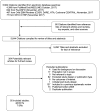Pharmacotherapy for Cocaine Use Disorder-a Systematic Review and Meta-analysis
- PMID: 31183685
- PMCID: PMC6854210
- DOI: 10.1007/s11606-019-05074-8
Pharmacotherapy for Cocaine Use Disorder-a Systematic Review and Meta-analysis
Abstract
Background: Currently, there are no accepted FDA-approved pharmacotherapies for cocaine use disorder, though numerous medications have been tested in clinical trials. We conducted a systematic review and meta-analysis to better understand the effectiveness of pharmacotherapy for cocaine use disorder.
Methods: We searched multiple data sources (MEDLINE, PsycINFO, and Cochrane Library) through November 2017 for systematic reviews and randomized controlled trials (RCTs) of pharmacological interventions in adults with cocaine use disorder. When possible, we combined the findings of trials with comparable interventions and outcome measures in random-effects meta-analyses. We assessed the risk of bias of individual trials and the strength of evidence for each outcome using standardized criteria. Outcomes included continuous abstinence (3+ consecutive weeks); cocaine use; harms; and study retention. For relapse prevention studies (participants abstinent at baseline), we examined lapse (first cocaine positive or missing UDS) and relapse (two consecutive cocaine positive or missed UDS').
Results: Sixty-six different drugs or drug combinations were studied in seven systematic reviews and 48 RCTs that met inclusion criteria. Antidepressants were the most widely studied drug class (38 RCTs) but appear to have no effect on cocaine use or treatment retention. Increased abstinence was found with bupropion (2 RCTs: RR 1.63, 95% CI 1.02 to 2.59), topiramate (2 RCTs: RR 2.56, 95% CI 1.39 to 4.73), and psychostimulants (14 RCTs: RR 1.36, 95% CI 1.05 to 1.77), though the strength of evidence for these findings was low. We found moderate strength of evidence that antipsychotics improved treatment retention (8 RCTs: RR 1.33, 95% CI 1.03 to 1.75).
Discussion: Most of the pharmacotherapies studied were not effective for treating cocaine use disorder. Bupropion, psychostimulants, and topiramate may improve abstinence, and antipsychotics may improve retention. Contingency management and behavioral interventions along with pharmacotherapy should continue to be explored.
Sr registration: Prospero CRD42018085667.
Keywords: cocaine; pharmacotherapy; substance use; systematic review.
Conflict of interest statement
The authors declare that they do not have a conflict of interest.
Figures
References
-
- Lipari RN, Van Horn SL. Trends in substance use disorders among adults aged 18 or older. The CBHSQ Report. Rockville: Center for Behavioral Health Statistics and Quality, Substance Abuse and Mental Health Services Administration; 2017. - PubMed
-
- Pani PP, Trogu E, Vacca R, Amato L, Vecchi S, Davoli M. Disulfiram for the treatment of cocaine dependence. Cochrane Database Syst Rev 2010(1):CD007024. doi: 10.1002/14651858.CD007024.pub2. - PubMed
Publication types
MeSH terms
Substances
Grants and funding
LinkOut - more resources
Full Text Sources
Medical
Research Materials
Miscellaneous




